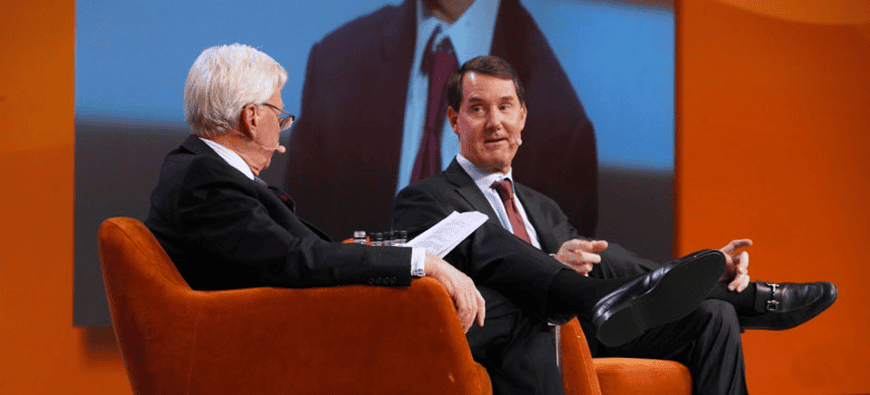
A Conversation With PNC’s William Demchak
When Pittsburgh-based The PNC Financial Services Group, a $557.3 billion bank, sold its 22% stake in asset manager BlackRock during the height of the financial crisis for $14.4 billion, executives didn’t know what to do with the cash. Chairman and CEO William “Bill” Demchak explained on stage at Bank Director’s Acquire or Be Acquired conference Monday why he sold BlackRock and turned around and bought BBVA USA within six months. He also offers advice to bankers doing deals. This conversation with Editor-at-Large Jack Milligan has been edited for length and clarity.
BD: What was the decision-making process to sell PNC’s stake in BlackRock in May 2020 for $14.4 billion and use the proceeds to acquire BBVA USA for $11.6 billion in November 2020?
WD: Before the government put out all the fiscal support, you’ll remember that we didn’t know if the mortality rate [of coronavirus in 2020] would be 10% or 1%. All I could think was: Make sure the bank has the most capital, a fortress balance sheet and is the one to survive the day. That led to the decision to sell BlackRock.
So I figured how my options might play out. It wasn’t a certainty that we would find a target [to buy]. If I sold BlackRock, the bank would be absolutely fine, the shareholders would be mad at me because we’d have too much capital and no BlackRock anymore and I’d get fired. That was OK: The bank, our employees and our clients would be great. If it turned out that we had a recovery and managed to land an acquisition target, that was a home run. In the end, that’s what it was. But that six months in-between was really tough.
BD: How did you prepare the board for that decision?
WD: I remember one director said, “You don’t normally sell something until you have the thing you’re going to buy in the other hand,” which is absolutely correct. But we weren’t long from the financial crisis. The bank with the most capital wins every time. We had a big stack of capital in our BlackRock stake that wasn’t recognized. Cashing in those chips was the right decision.
BD: How was the acquisition received in Washington? Did you have any sense that regulatory attitudes toward large bank M&A were changing?
WD: Yes, although we probably didn’t realize how close we were. There’s been a sea change in Washington on large scale consolidation, as they looked at the risk of combining institutions, both theory and economic risk, but also community-based risk. And we made it through a window before that. Although I will say, we made it through the approval process without a single negative letter sent to the regulators.
BD: What did the BBVA USA acquisition do for PNC that you didn’t have before?
WD: Between BBVA and markets we opened up on our own, we went from being in probably 12 of the largest MSAs just a handful years ago to now being in the top 30. It’s remarkable the growth prospects of the markets that we’ve entered. Houston has gone from not being on our radar to being almost our third largest market. What we’ve seen in Colorado is just as tremendous.
BD: Do you foresee PNC doing another acquisition?
WD: I think we have to.
BD: And you think you will be allowed to?
WD: I don’t know. There’s a horrible joke: You’re in the woods and a bear’s chasing you and you’re lacing up your shoes. You can’t outrun the bear, but you don’t have to. You just have to outrun [the person you’re with]. And there’s a lot of banks in this room I can outrun. But the bear is going to get you eventually, if they don’t change the way they look at competition and the different risks in the banking system to allow banks to grow larger.
BD: Acting Comptroller of the Currency Michael Hsu recently gave a speech raising the issue of banks that he referred to as “too big to manage.” He said the OCC is beginning to work on a structure, almost a decision-making tree, of what the regulators could do to deal with a bank that they think is too big to manage. What’s your thoughts on that? Can a bank be too big to manage?
WD: I suppose anything can be too big to manage if you don’t have the right management team to help pay attention to stuff. … We’re a large bank, but we’re in the basic business, probably in the same business as [most of the bankers attending Acquire or Be Acquired]: We serve retail customers with deposits, savings, loans, traditional products. We serve corporate customers with treasury management, and lending products. … But we’re just doing what we’ve done for 165 years.
BD: What have you learned about M&A over the years that you think would be useful for this group to hear?
WD: In the simplest form, understand the reason you’re doing it. Have a clear purpose as to why, other than just trying to get larger. Make all the tough choices that you don’t want to make on people, on technology. Make the choices that are going to hurt today that pay dividends tomorrow. Under-promise, over-perform. Deals are tough. Integration of systems, particularly if both institutions have legacy tech, is really hard. You’ve got to go into it with your eyes wide open, so that whatever comes out of the other side is worth the pain you’re going to cause your employees and sometimes your shareholders.



